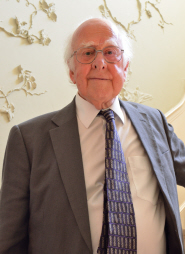Jul 10 2013
Eminent scientist Professor Peter Higgs, one of the world's leading theoretical physicists and the man after whom the famously elusive Higgs boson is named, has been honoured in Bristol.
 Professor Peter Higgs
Professor Peter Higgs
Professor Higgs, who spent his school days in Bristol at Cotham Grammar School and has close links with the University of Bristol, was awarded the freedom of the city on Tuesday [9 July].
He was recognised for his work during a special ceremony at City Hall and also took the opportunity to meet with fellow academics from the University, which hosted a special lunch in his honour.
Attendees included the Lord Mayor of Bristol Councillor Faruk Choudhury, Bristol University’s Vice-Chancellor Professor Sir Eric Thomas and representatives from the School of Physics.
The retired Edinburgh University physicist was one of a small group of physicists who carried out ground-breaking theoretical work in the 1960s, leading to the development of the 'standard model' of particle physics. This model is our best understanding of the laws of nature at the most fundamental scale, which governed the development of our Universe soon after the Big Bang.
Professor Higgs predicted the existence of a unique type of fundamental particle - now named the Higgs boson in his honour - which is essential in allowing the mathematics of the standard model to work. The existence of the boson was a matter of intense speculation for 50 years, until its final discovery last year at the CERN Large Hadron Collider (LHC) - the world's most powerful particle accelerator.
The discovery of the Higgs boson was made independently in 2012 by two huge international experiments. The University of Bristol collaborated in the design and construction of the Compact Muon Solenoid detector (CMS). The collision data which provided the evidence for the Higgs boson was processed and filtered through electronics and computer systems designed and developed at the University.
Professor Dave Newbold, Head of the Bristol Particle Physics Research Group, said: “The seminal work of Professor Peter Higgs set the agenda for particle physics research for decades, including the design of the giant LHC detectors at Bristol and elsewhere. The discovery of the Higgs boson was a huge step forward, and has opened up a wealth of questions for a new generation of researchers.
“Peter spent his school days in Bristol, and it's fantastic that the City of Bristol has chosen to recognise both his achievements, and the importance of this science, by awarding him the freedom of the city."
Professor Higgs lived in Bristol from 1941 to 1946, when he attended Cotham Grammar School. His career in physics was partly inspired by the work of another famous alumnus, Paul Dirac, who won the Nobel Prize in 1933 for combining quantum mechanics with Einstein's relativity.
Professor Higgs received an honorary degree from the University in 1997, and last year gave a scientific lecture in the School of Physics, which was attended by over 600 staff and students.
Experimental particle physics, the study of space, time and matter at the smallest scales, is an activity carried in the pursuit of new scientific knowledge. However, there have been many spin-off developments in other scientific, technical and industrial areas.
For example, the world wide web was originally developed at CERN by a UK scientist in order to share technical information, and the PET-CT scanner that revolutionised medical imaging had its origins in research and development at CERN by a Bristol graduate.